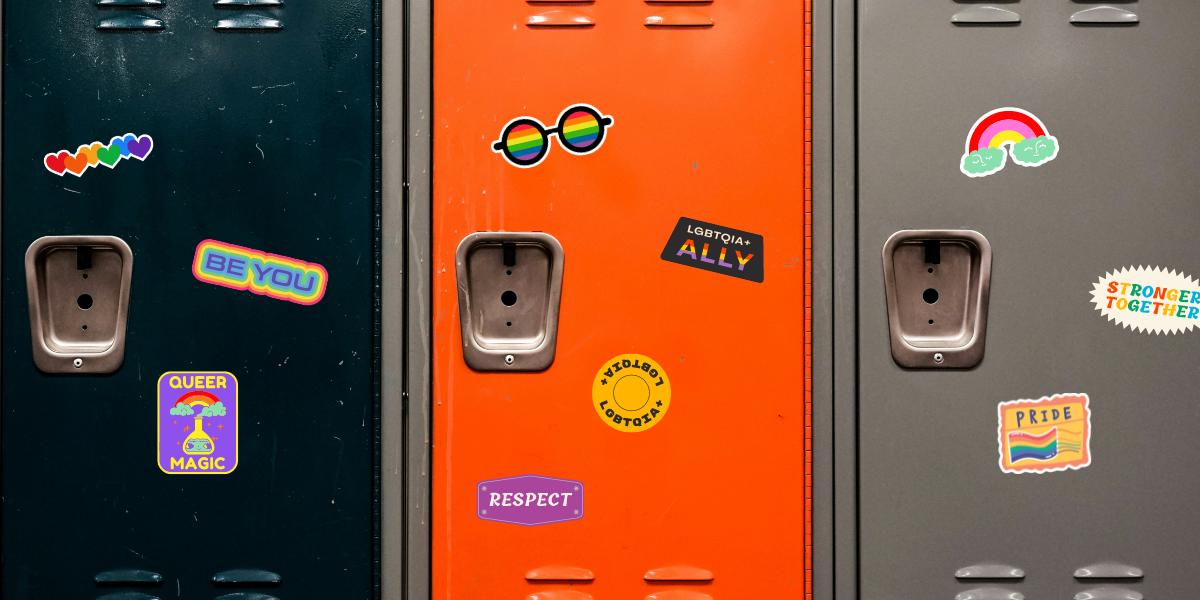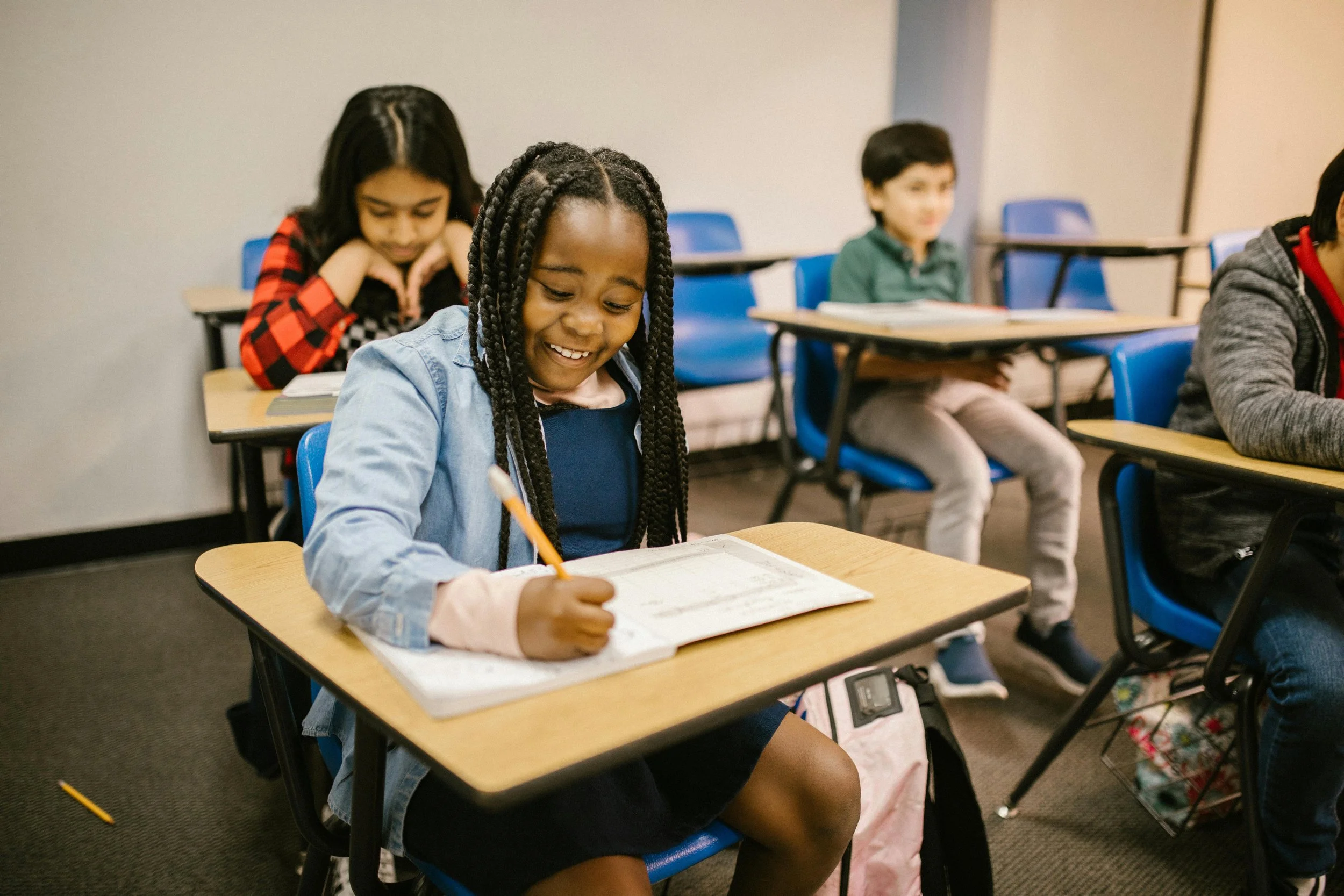Not Today, Sir. Not Today. How to Fight: Resistance, Ownership, and Equity
This piece explores the themes of resistance, ownership, and equity, drawing parallels between the author's personal experiences, the history of education for Black Americans, and broader societal structures. It begins with a reflection on the author's early education at the Hampton Institute Non-Graded Laboratory School, highlighting its commitment to racial integration and skill mastery. The piece then connects this to the story of Emancipation Oak, under which Mary Peake taught enslaved Black Americans to read and write, emphasizing the importance of literacy and liberation.
When I Grow Up, I Want to Be A Monster - Conversation Guide
This guide is rooted in the belief that equity work is the work of coming together. It is about seeing each other fully, telling the truths we were taught to ignore, and taking collective responsibility for healing and repair. To do this, we must correct our vision—moving beyond politeness and silence toward honest reckoning and meaningful action.
When I Grow Up, I Want to Be a Monster
This could be the fate of America’s children if we stop investing in our collective liberation. In other words, this is why we will not stop doing equity work, and you should not either.
Was it a fever? The heat came from the middle of my back and squeezed my shoulders. It descended my arm and came out through my now sweaty palms.
The Intelligence We Design: AI, Imagination, and Progress
AI is not neutral; it is shaped by human intention, the stories we tell ourselves about the world, and the futures we dare to imagine. In many ways, AI is a mirror, reflecting back the values embedded in its creation. If extinction is the goal, we build intelligence for extinction. If our goals shift—to equity, healing, or liberation—then we build intelligence that moves in that direction.
How to Move When Life Does Not Make Sense
The break—when it happens—always catches you off guard, even when it's both probable and possible.
What starts as a constriction in the chest dissipates into a dull ache that pulses to the extremities of the gross body—reaching the fingers and toes. It rests like a lump in the throat, wringing tears out of every word when the courage to speak is mustered. The worst breaks settle in bones and muscles, creating a vast gap between impulse and action. Digestion is interrupted. Rest avoids sleep. The body is frozen, suspended in a liminal space between hope and reality. Breath stops. It doesn't move.
Introducing Immersive Equity™ : A Blueprint for A New Future
Imagine stepping into a space where we can practice the world we want to create—where equity isn't just a policy or promise, but something we can see, touch, and feel. Through virtual reality, we can build environments where resources flow to those who need them most, and where we can rehearse new ways of distributing power.
The Codesign Collective: Crowdsourcing Human Intelligence in the Age of AI– Part 1
In this series, we explore the roles teachers can play in shaping AI technologies to meet the needs of their classrooms and communities. Today’s educators are navigating extraordinary challenges—the youth mental health crisis, the profound impacts of poverty, systemic inequities, and the eroding support for public education. They shoulder the weight of preparing students—whether in the most under-resourced urban environments or the most affluent settings—for an increasingly complex and uncertain future.
Reflections on a Difficult Week: Processing, Self-Preservation, and Radical Self-Care
This month, we’re doing something special at 228 Accelerator. We’re featuring an essay by Sharon Michaels, Ed.D, the Founder of Disrupt Forward, a social impact consulting firm committed to enhancing the well-being of K-12 teachers and school leaders. I believe Dr. Michaels’ words capture much of my own feelings at this moment, and I hope you find solace in them, as I have.
How We Can Start Living The Future We Want Today
In times of disruption, schools face a critical opportunity: not just to adapt but to redesign systems that prioritize equity and inclusion. By centering marginalized voices, fostering empathetic relationships, and modeling equity in every interaction, educators can shape a more just future. This moment calls for more than resilience—it calls for a collective commitment to build environments where all students and staff thrive, living the future we envision today.
Untangling the Lines of History: Expanding the Stories We Teach Our Children
In the grand tapestry of history, the stories we tell form a web of intersecting lines. Some of these lines are celebrated and pulled to the forefront, woven into the fabric of our collective memory. Others are buried and tangled in the background, their importance obscured by the prominence of a few. Cesar Chavez is one of those bright lines—a leader whose legacy shines through the history of labor movements in America.
Growing Forward: Cannabis and the New Democracy
When she grows and is allowed to grow, her core is strong. When crowded, she will stretch up to the sun for light. When she has room, she branches left and right in all directions.
EquityxDesign: The Power of Sharing Stories
At 228 Accelerator, we are driven by the belief that the most powerful changes begin at the margins, where voices often go unheard.
Today, we are thrilled to reshare an essay by Lauren Overton, Principal at Penn Alexander School District in Philadelphia and a good friend of our organization.
“They Taught Me More than I Taught Them:” Situating Youth as the Experts in Learning Spaces (Part 2)
As a reminder to readers, we’ll include the introduction to Andre’s piece here, then we’ll jump into the second lesson he shared with us.
For the past three years, I have been working on my doctoral studies in educational and organizational leadership the centers the significance of organic critical literacies (Campano et al., 2013) and formulating a research study that embodies multiple truths about myself: my intersectional identity as Filipinx and Queer; my love for the brilliance and authenticity of our queer youth; and my passion for collectivist and collaborative inquiries.
“They Taught Me More than I Taught Them:” Situating Youth as the Experts in Learning Spaces
For the past three years, I have been working on my doctoral studies in educational and organizational leadership the centers the significance of organic critical literacies (Campano et al., 2013) and formulating a research study that embodies multiple truths about myself: my intersectional identity as Filipinx and Queer; my love for the brilliance and authenticity of our queer youth; and my passion for collectivist and collaborative inquiries.
Brown v. Board: 70 Years of Integrating Education and Expanding Democracy
On Friday, May 17, 2024, our country celebrated the 70th anniversary of Brown vs The Board of Education—the landmark decision that declared segregation an inequality, legally mandated the integration of schools, and pushed us closer to creating a multicultural, multiracial, multiethnic democracy.
Everybody Loves Gladys’ Sweet Potato Pie: Cultural Knowledge for Collective Wisdom
Everybody loved Gladys’ sweet potato pie. On the highest of holy days, this was our communion—in each bite, we shared the memories of the fingers that assessed the size and readiness of the sweet potatoes, the hands before that selected the right ones, boiled them, and peeled the skin; and the muscular and tender arms that whipped the cooked potatoes—thick, sweet, buttery— also held the stories that never got outdoors. They stayed inside and folded into family secrets and spices.
The New Democracy Starts In The Classroom
Exploring the depths of cultural memory and the hues of identity, this post delves into personal memories that resurfaced after witnessing the latest rendition of 'The Color Purple'. This introspective piece reflects on Caroline's vivid holiday experiences, interweaving personal narratives and blood memories with insights from Toni Morrison's 'The Bluest Eye'. It contemplates how schools can act as conduits for cultural and racial understanding, breathing life into collective memory and reorienting relationships. This blog not only acknowledges the intricate tapestry of past and present but also envisions a future where diverse experiences and memories coalesce, advocating for a shift in educational paradigms towards inclusivity and environmental justice.
Remembering The Instants In The 405th Year
The New Year welcomes us to engage in instants of reflection.
We collectively pause, reconsider, recollect, and remember. These rituals may manifest in commitments to our bodies — to drink less or lose weight — or they may be slower, otherworldly journeys that challenge the beliefs about the body, its purpose, and its home. For the latter, each step is a pilgrimage of sorts: a journey intentionally crafted to remember and to put the self back together again.
What Does Revolution Sound Like?
As a child, I did not know that Bayard Rustin was a gay black man with brilliance, strategy, and a prophetic fire that fueled a vision that many could not see or imagine. As the chief architect of the March on Washington, few people could imagine what the multicultural, multiracial democracy would look like once realized. The dream, inspired by the imagination of a black woman—Prathia Hall, and rhetorically remixed by Martin Luther King—crystallized the dream for the masses. But the dream itself—an iteration of the multiracial, multiethnic, multicultural democracy may actually have been realized in the March on Washington, itself.
Anti-Blackness and the Haunts of White Supremacy
Anti-blackness is the progeny of white supremacy that haunts not just white people; it haunts everyone. It haunts our standards of beauty. It haunts our structure of language and expression. It casts spells of inadequacy, urgency, and scarcity, fomenting fracture in its wake. It waits patiently for its next host, exploiting heartbreak, grief, and misfortune. Its conjuring strikes the fear of deprivation and poverty, forcing bodies to conform to invisible standards of acceptance that always seem to shapeshift in proximity–quite devilish indeed.




















